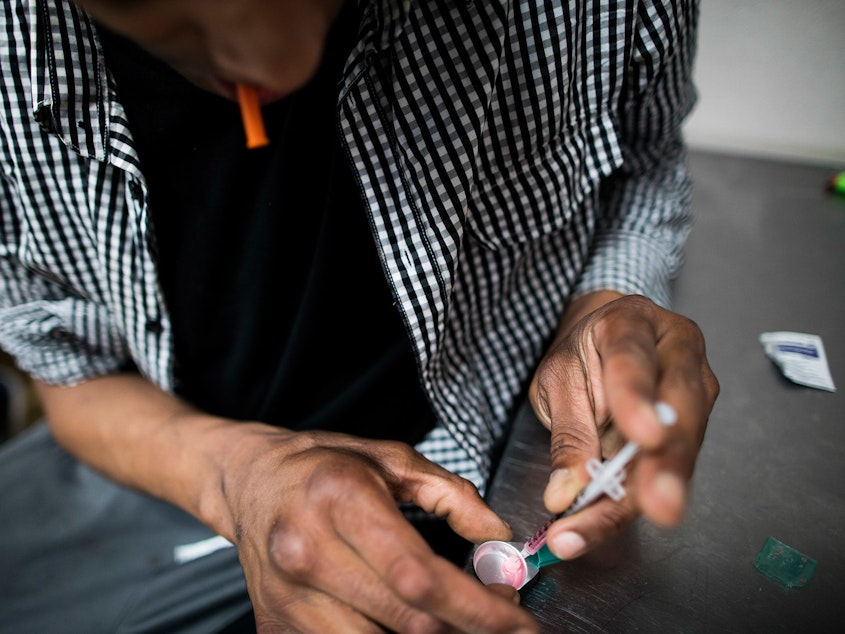New York City allows the nation's 1st supervised consumption sites for illegal drugs

Officials in New York City say the first government-sanctioned supervised drug injection sites in the nation began offering services to people with addiction on Tuesday.
The program, backed by Mayor Bill DeBlasio, is part of the city's "harm reduction" strategy designed to reduce an unprecedented surge of overdose deaths.
"After exhaustive study, we know the right path forward to protect the most vulnerable people in our city," DeBlasio said in a statement Tuesday. "Overdose prevention centers are a safe and effective way to address the opioid crisis."
According to city officials, more than 2,000 people in New York City died from fatal overdoses in 2020. The safe drug consumption sites will be operated at sites that also offer clean needles and other services.
A feasibility study conducted by the NYC Health Department found the program could save "up to 130 lives a year."
Sponsored
The centers located in the Manhattan will be operated by a new nonprofit group called OnPoint NYC formed by two organizations focused on harm reduction.
"Being the 1st OPC site in the US is an honor & incredible step forward in ending the opioid crisis," the group said in a post Tuesday morning on Twitter.
People with substance use disorder will be able to inject heroin and other illicit drugs under the care of medical professionals. They will also be offered access to addiction treatment and other healthcare.
Similar sites in Australia and Canada have proven successful at preventing overdoses, reducing drug use in public places, and promoting safer injection practices that reduce the spread of diseases such as HIV/AIDS and hepatitis.
Supervised injection sites have been proposed in cities including Denver, Philadelphia, San Francisco and Seattle. But drug war-era policies and legal challenges have long delayed creation of safe drug consumption programs in the U.S.
Sponsored
In January, a panel of federal judges blocked creation of a supervised injection site proposed in Philadelphia. "[T]he opioid crisis may call for innovative solutions...[but] local innovations may not break federal law," judges with the 3rd U.S. Circuit Court of Appeals concluded.
In the months since that ruling, drug overdose deaths have continued to surge nationwide, with more than 100,000 Americans in a single 12-month period for the first time, according to the Centers for Disease Control and Prevention.
Earlier this month the Biden administration declined to endorse safe drug use sites as a strategy for reducing fatal overdoses.
During a press conference earlier in month, Dr. Rahul Gupta head of the White House Office of National Drug Control Policy said the matter would be decided by the courts.
"We cannot address this specifically around overdose prevention sites primarily because of ongoing litigation," he said.
Sponsored
It's unclear whether New York City's safe injection program will face opposition and legal challenges. De Blasio has acknowledged the possibility of a federal crackdown.
In April, he and other mayors sent a letter to U.S. Attorney General Merrick Garland urging him to issue a statement on behalf of the Department of Justice saying the enforcement of federal law against supervised injection facilities would not be a priority.
Although he never received that assurance, de Blasio said last month he was optimistic the centers would be allowed to stay open. keep their doors open.
"We have a new administration in Washington, a new administration in Albany," de Blasio said on October 26th. "It was the right time to do something on this topic while we could finally have the kind of potential cooperation we need."
Since announcing his support for the project in 2018, the de Blasio administration has also been working with the NYPD and district attorneys to ensure the sites can operate without the interference of local municipal law enforcement.
Sponsored
Spokespeople for the Manhattan and Brooklyn DA's confirmed to WNYC/Gothamist their support for overdose prevention centers. WNYC/Gothamist did not get a response from Bronx DA Darcel Clark, who has previously spoken out against the facilities.
"Government should not be involved in taking on that type of liability," Clark said in 2019. The NYPD did also not respond to a request for comment.
New York Gov. Kathy Hochul also continues to hedge on the issue.
"Gov. Hochul is deeply and personally committed to combating the opioid epidemic, and all options are on the table to save lives," a spokesperson for the governor's office told WNYC/Gothamist.
Mayor-elect Eric Adams, who takes office in January, has made it clear he supports overdose prevention centers.
Sponsored
Caroline Lewis of WNYC/Gothamist contributed to this report. [Copyright 2021 NPR]

